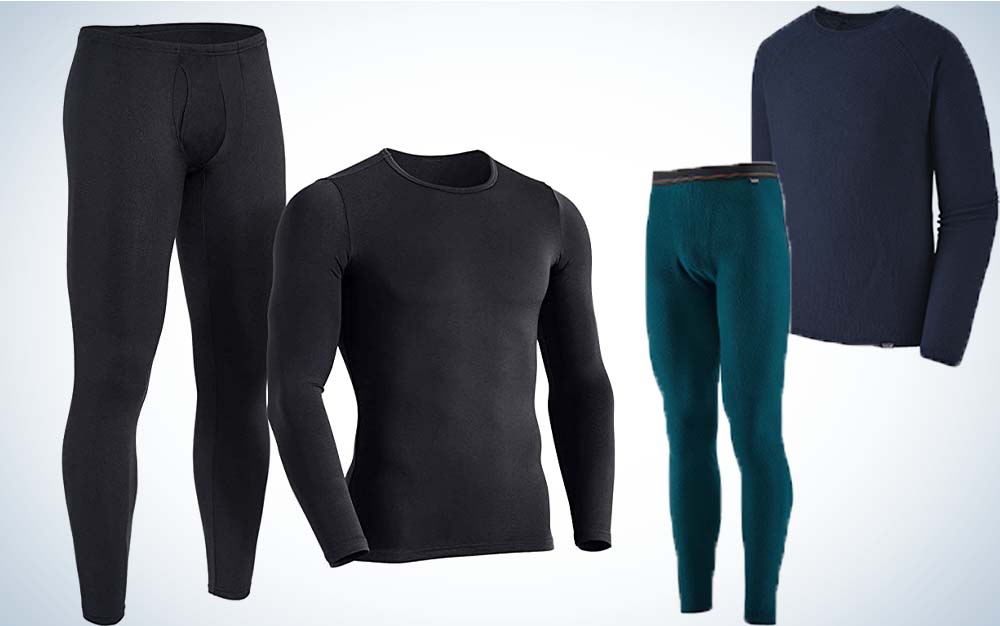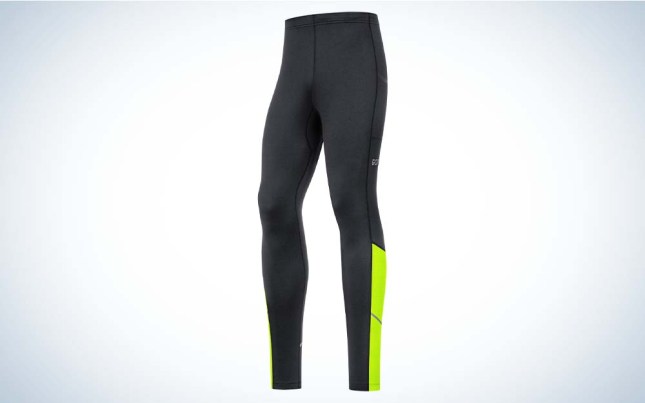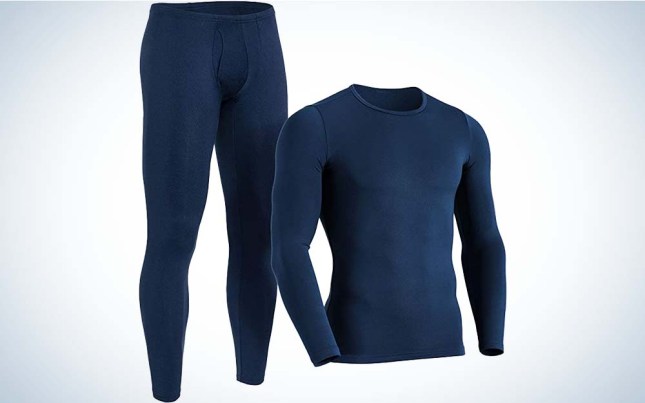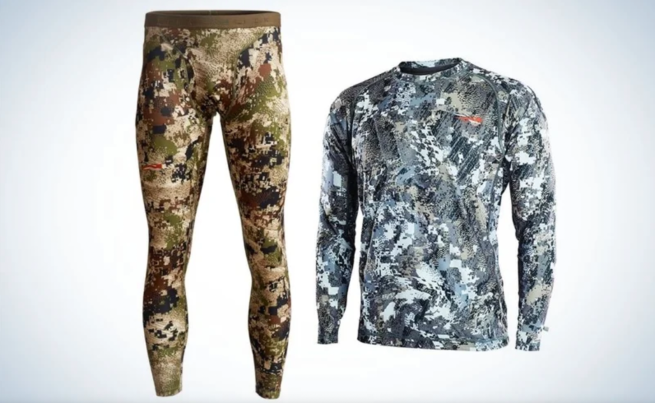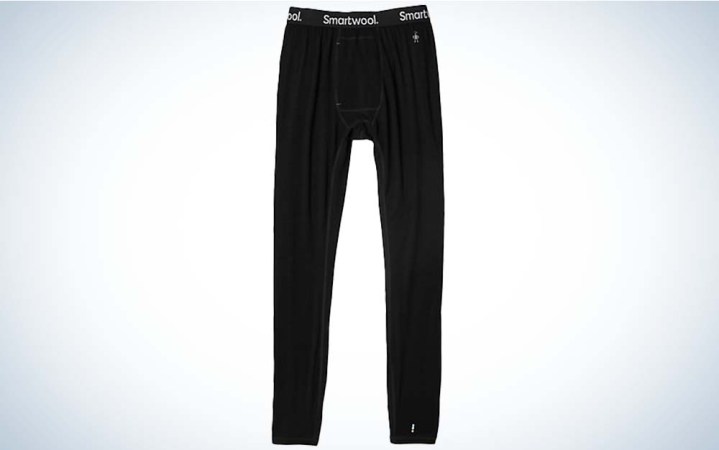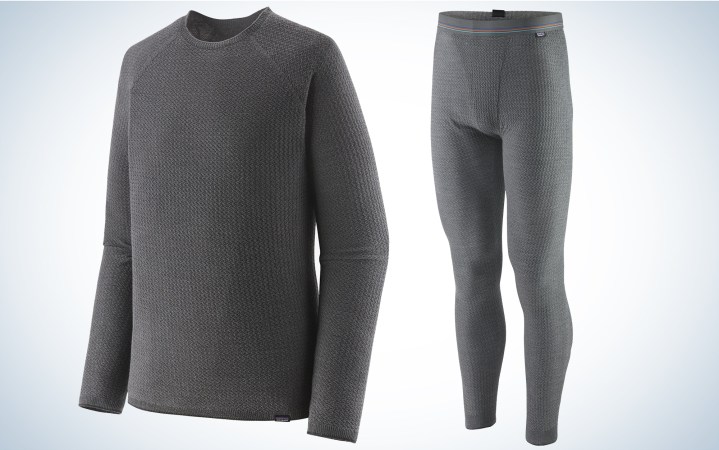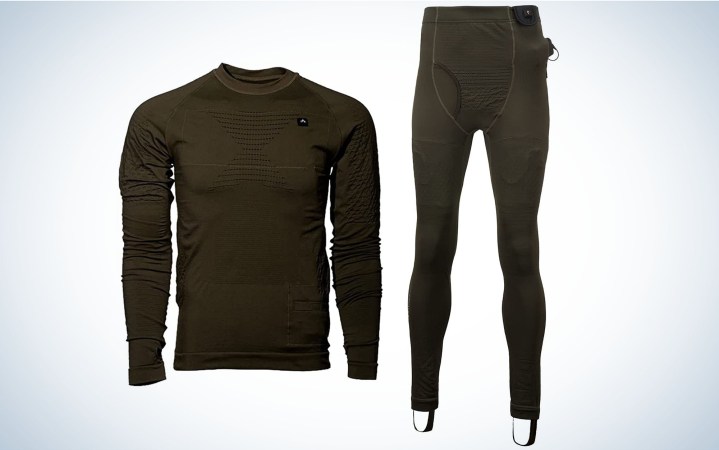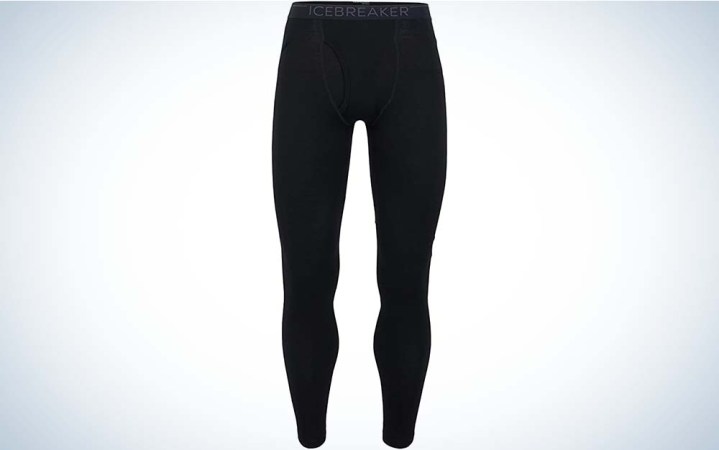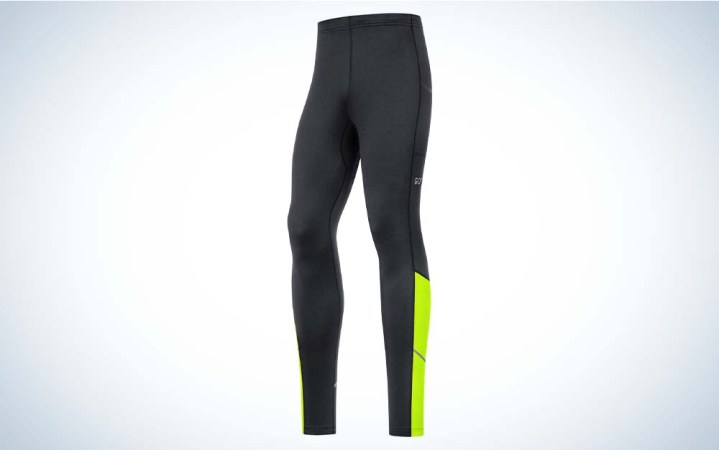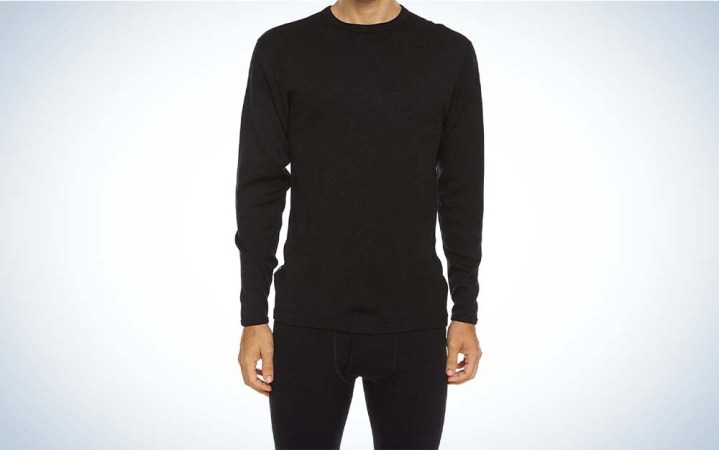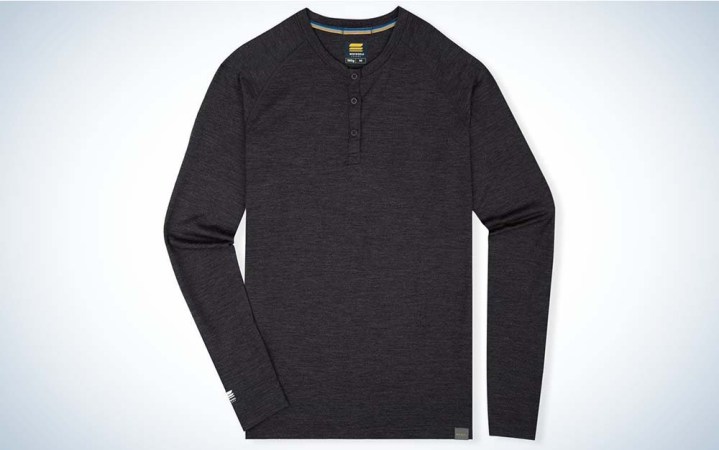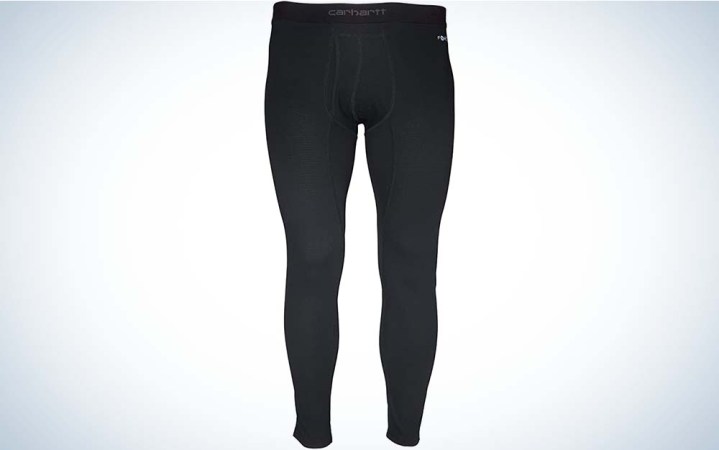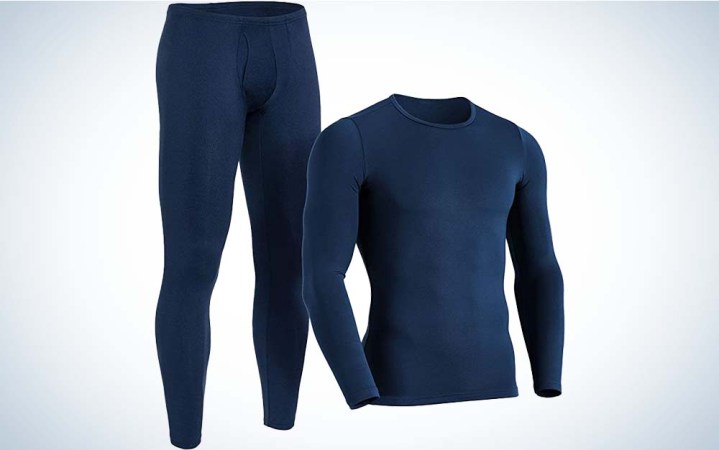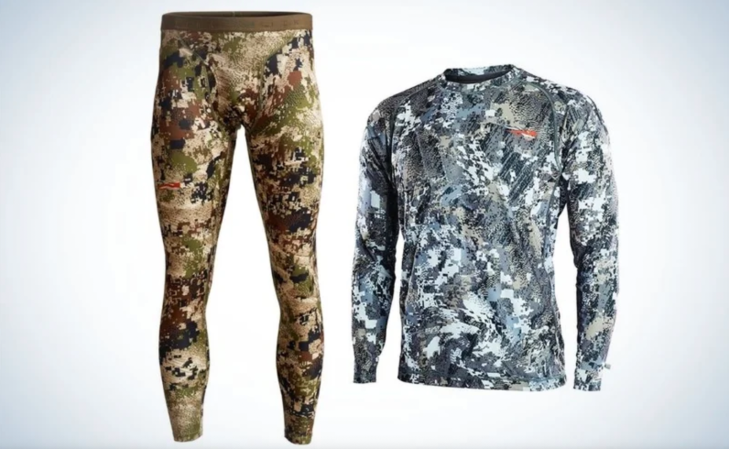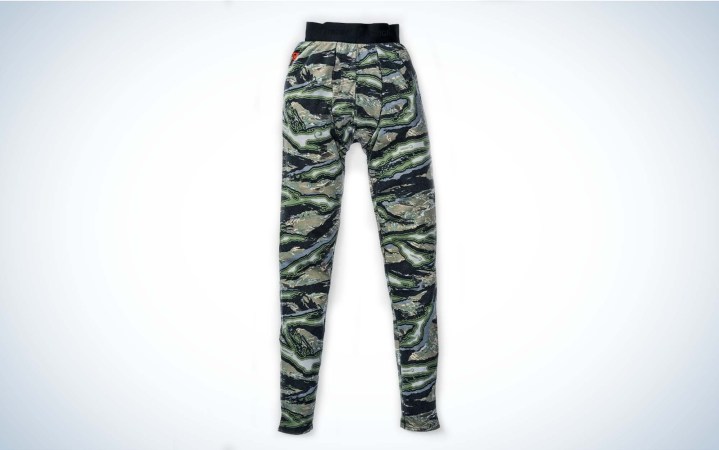We may earn revenue from the products available on this page and participate in affiliate programs. Learn More ›
A good pair of thermal underwear for men should keep you warm whether you’re working outside, braving the early morning cold on a run, camping in the backcountry, or hitting the slopes on fresh powder days. I live in Wisconsin where winter temps can hit brutal lows, so having a solid pair of thermal underwear is critical, especially since I spend most of my time outside. While some options are rated for different temperatures and activities, the best thermal underwear for men should keep you warm and dry under all conditions.
- Best Overall: Smartwool Merino 150
- Best Lightweight: Patagonia Capilene Air Crew
- Best Electric: Pnuma Outdoors ICONX Heated Core Shirt and Pants
- Best for Extreme Weather: Icebreaker Merino Leggings
- Best for Running: Gore Wear R3 Thermo Tights
- Best for Skiing: Minus33 Yukon Men’s Crew
- Best for Camping: Meriwool Mens Merino 190 Long-Sleeve Henley
- Best for Work: Carhartt Force Classic
- Best Budget: TSLA Men’s Thermal Underwear
- Best for Hunting: SITKA Core Lightweight Bottoms and Top
- Best USA Made: Origin Nano Wool Alpha Layers
How I Tested the Best Thermal Undewear for Men
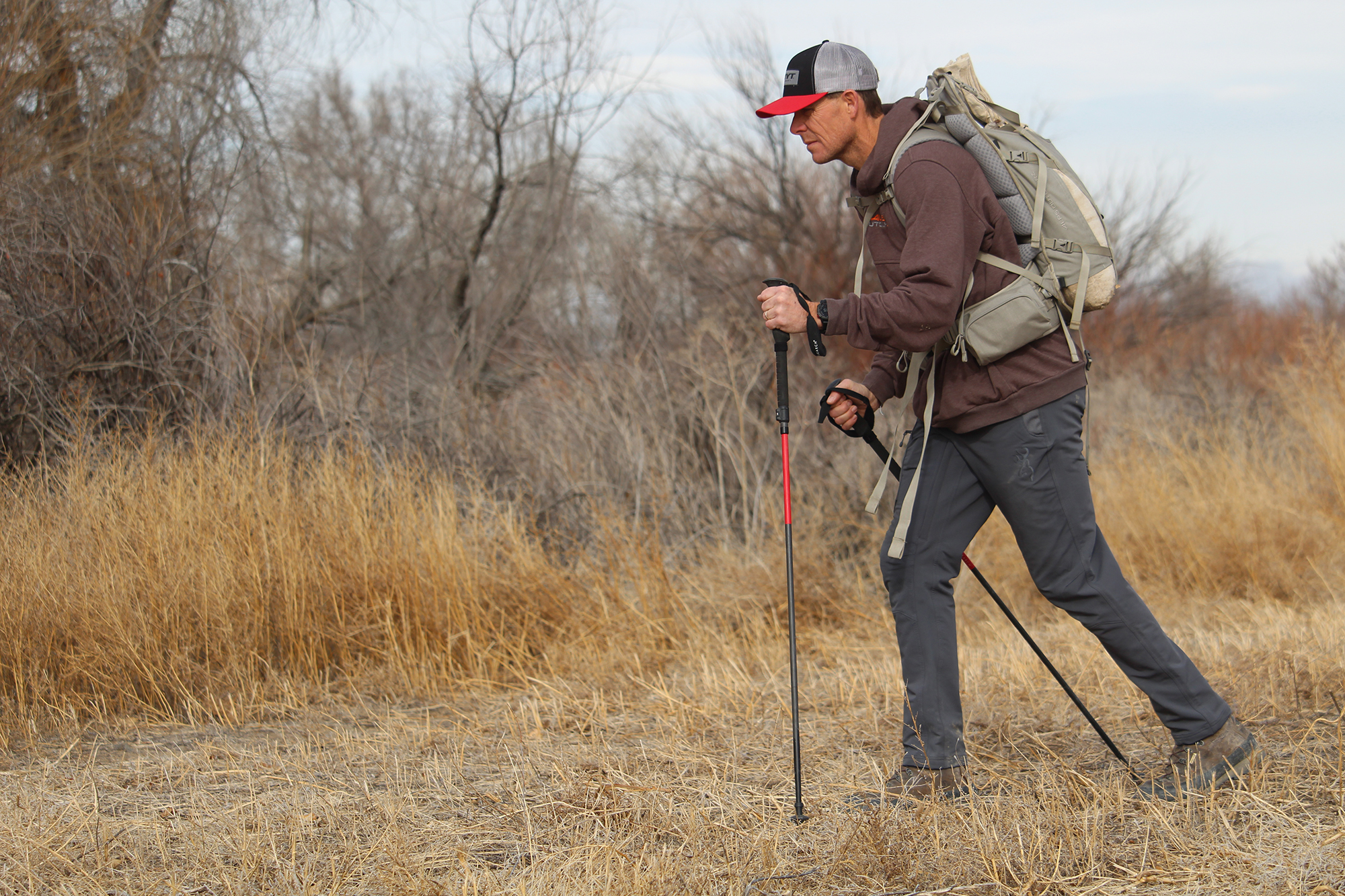
In order to determine the best thermal underwear, I tested each of these for comfort, durability, breathability, and overall warmth. I tested these tops and bottoms while running, skiing, and throughout everyday activities to determine which fit comfortably and worked best. I also spent a lot of time talking to friends and family members about their thoughts on these as well.
Best Thermal Underwear for Men: Reviews & Recommendations
Best Overall: Smartwool Merino 150
Key Features
- Slim fit
- Flatlock seam construction
- 87 percent merino wool, 13 percent nylon core
- Weight: 6 ounces
Pros
- Slim, lightweight
- Durable
- Super warm
- Not restricting
- Multiple colors and patterns
Cons
- Too warm for some activities
I have been a fan of Smartwool for years. Their products are durable and downright comfortable, and the 150 line is no exception. Once I slipped the tops and bottoms on, I almost forgot I was wearing them. And I don’t mind wearing these all day. These Merino layers do a fantastic job of regulating your body temperature and wicking moisture. I’ve used them skiing, camping, and hiking in cold temps, and I’m always impressed by how well their profile contours your body and keeps you warm. Pair these with some of the best hiking pants, and you’ll be prepared to face even the most frigid temps outdoors.
Best Lightweight: Patagonia Capilene Air
Key Features
- 18.5-micron-gauge yarn
- Seamless 3-D construction
- Merino wool blended with recycled polyester
- Weight: 6 ounces
Pros
- Lightweight
- Warm
- Great moisture wicking
- Naturally odor resistant
Cons
- Pricey
As soon as I tried on the Patagonia Capilene Air men’s medium top and medium bottoms, I was immediately impressed by how comfortable they were. The top felt lightweight with a snug fit, and the bottoms, though form fitting, didn’t restrict any movement. I also appreciated their breathability, especially during long runs.
In colder weather, I noticed these thermals did an excellent job wicking moisture while I ran or biked. Even after sweating and wearing these for several days, I didn’t notice any terrible odor. They didn’t smell brand new, but they didn’t necessarily need washing either.
Best Electric: Pnuma Outdoors ICONX Heated Core Shirt and Pants
Best Electric
Pnuma Outdoors ICONX Heated Core Shirt and Pants
Key Features
- Carbon-fiber heating elements
- Powered by rechargeable lithium batteries
- Three heat settings
- Athletic fit for easy layering
- Polygiene anti-odor treatment
Pros
- Excellent for sitting still in a blind or treestand
- Heating elements in focused areas for maximum warmth
- Good general base layer without the heat
- Batteries are easy to re-charge
Cons
- Can’t machine wash
- Not great as a high-activity base layer
Battery-heated gear, such as vests and socks, are viewed by many as a gimmick to con the unwitting sportsman out of a few bucks, but in the era of lithium batteries and advanced heating elements, they are an invaluable tool for low-activity hunting in cold weather. I recently was able to test the Pnuma ICONX Heated Core shirt and pants on a wolf hunt in Canada, and I’ll be using them more.
The Pnuma ICONX heated base layers are tight-fitting and functional as a general base layer without the heat, but they feature carbon-fiber heating elements strategically placed for maximum warmth. The heating elements are powered by a single rechargeable lithium battery that can double as a power bank. The shirt and pants each use their own battery.
The ICONX layers must be washed by hand and hung to dry, but they have a Polygiene anti-odor treatment, so you shouldn’t need to wash them as often, in theory. These base layers have three heat settings with run times of 2, 3, and 6.5 hours for high, medium, and low respectively. My hunt in Canada involved sitting still in a un-heated blind for 60 hours, 10 hours per day, and I’d usually turn the heat on for the last half of the day. It made a huge difference in my comfort. Even with the best base and insulating layers, it’s difficult to stay warm while sitting still in cold weather, and the Pnuma ICONX was excellent for that application. —Tyler Freel
Best for Extreme Weather: Icebreaker Merino Leggings
Key Features
- 100 percent merino wool
- Machine washable
- Flatlock seams
- Contoured pouch with functioning fly
- Icebreaker branded brushed elastic waistband
- Gusseted build
- Weight for Large: 12.8 ounces
Pros
- Breathable
- Comfortable, slim fit
- Versatile
- Naturally odor free
Cons
- Might run a tad big for some
I have thick, stocky legs, so finding thermals that don’t feel like they’re cutting off circulation often proves challenging. But the Icebreaker 260s fit comfortably, and I didn’t notice them restrict any movement. These 100 percent merino wool thermals kept me warm on some of Wisconsin’s coldest days, yet they were extremely breathable. While the Icebreaker 260s work great for super cold days, they’re probably too warm for milder temps or super active outings.
Best for Running: Gore Wear R3 Thermo Tights
Key Features
- Brushed fleece lining
- Reflective details
- Small zippered rear pocket
- Flatlock seams
- Side pocket
- Weight: 7.6 ounces
Pros
- Super breathable
- Snug fit
- Warm
- Wear them as a standalone piece
Cons
- Not many color options
The minimal profile of the R3s sold me on these thermals. These super lightweight bottoms are the best thermal underwear for men for running. They kept me warm on some of my coldest runs, yet the GoreTex proprietary material wicked moisture and helped me stay dry. While these are plenty warm, they’re not too hot for long, tough runs. Not only does the R3 line excel performance wise, but the thoughtful details like reflective strips, the side pocket on the thigh, and the rear pocket for keys or your phone makes them a no-brainer for running. And the fleece-lining feels like you’re wearing a cloud even on that last mile.
Best for Skiing: Minus33 Yukon Men’s Crew
Key Features
- 100 percent merino wool
- 50+ UPF Rating
- No itchy neck tags
- Flatlock seams
- Weight: 17 ounces (large)
Pros
- Plenty warm for frigid temps
- Excellent moisture wicking
- Flexible, breathable design
- UPF 50+ rating
Cons
- Feels a tad thick
As a skier, I prioritize warmth over all else when it comes to thermals, and these exceed that requirement. They’re thicker than most but also comfortable and not too snug on the skin. And I’ve never had an issue with mobility while skiing in them thanks to the strategically stitched seams. These Minus33 thermals are plenty warm for the coldest days and comfortable whether you are carving groomers or plowing through powder. They’re also excellent at wicking moisture and holding scent to a minimum. Even after multiple hard ski days in a row, these thermals didn’t smell the worst. If they have any downfall, it’s that they’re probably too warm for activities that don’t involve snow.
Best for Camping: Meriwool Mens Merino 190 Long-Sleeve Henley
Key Features
- 190g/m2 weight jersey knit Merino wool
- 100 percent all-natural superfine 16.5-micron fibers
- Button closure
- Raglan sleeves
Pros
- Warm yet breathable
- Anti-bacterial & odor-resistant
- Wicks moisture efficiently
- Raglan sleeves don’t restrict movement
- Versatile henley design can be dressed up or down
Cons
- Not as snug as other options
This Meriwool 100-percent merino wool henley makes a great versatile thermal for your camping layers. It’s warm enough to layer for colder temps, yet breathable enough to wear as a standalone piece.
The button closure at the top and slim-fit make this the best thermal underwear for men that can go from trail to town. You can wear it to dinner, whether it’s served by the campfire or at a restaurant. And the raglan sleeves don’t inhibit any movement. While wearing this thermal, I noticed that it moved with me no matter what I did, and I even forgot that I was wearing it when I wore it as a base layer.
Best for Work: Carhartt Force Classic
Key Features
- 100 percent polyester
- Pull-on closure
- Concealed thumb loops (top)
- Waffle knit construction
- Smooth flatlock seams
- Weight: 8.8 ounces
Pros
- Rugged Flex material doesn’t restrict movement
- Comfortable
- Wear it as a standalone piece
- Durable
- Moisture wicking
Cons
- Some might not prefer 100 percent polyester construction
I tested these Carhartt thermals on some of the coldest Wisconsin winter days this year. These kept me warm while I shoveled tons of snow and split and stacked firewood. They make an excellent midweight base layer that’s warm and comfortable to wear. And their 100 percent polyester construction may not be as warm as merino wool, but they’re highly flexible and designed for constant movement. They don’t wick moisture as well as other options on this list, but they still do an adequate job. But as long as you’re not running, these thermals make an excellent option for long days in the cold.
Best Budget: TSLA Men’s Thermal Underwear
Key Features
- Four-way stretch fabric
- Micro-fleece lined
- Top and bottom set
- Mix of polyester and elastane fabric
- Weight: 3.2 ounces
Pros
- Warm
- Snug fit
- Easy to layer
- Breathable
Cons
- Runs small
This best thermal underwear for men packs a price tag that’s hard to beat. Cheap thermal underwear usually fails to keep you warm, runs too bulky, or doesn’t wick moisture as efficiently as it needs to; however, I was impressed by how much warmth these actually provided. And the stretch and microfleece lining make them comfortable to wear all day. As far as moisture wicking goes, these did an adequate job while I ran in them, but for long distance runs, they might not be the best option.
The TSLAs definitely weren’t the warmest in the test, but that’s to be expected at this price point. While the other options I tested ran true to size, these ran a bit small, and I would suggest sizing up, especially if you have muscular or thick legs. Still, these make a great option for everyday use, and you won’t lose sleep over this price tag.
Best for Hunting: SITKA Core Lightweight Bottoms and Top
Key Features
- 100 percent polyester
- Odor control technology
- Weight: 4.6 ounces (size: large)
- Quick dry
Pros
- Lightweight
- Durable
- Odor control
- True to size
- Versatile
- Cool camo patterns
Cons
- Pricey
The SITKA Core top and bottoms are my go-to any time I hit the woods. They’re lightweight and warm, yet their moisture wicking capabilities keep you dry even when you’re sweating through run-n-gun turkey hunts or deep, public treks to the deer stand. This makes them a versatile set of thermals and one of the best base layers for hunting, and I basically live in them from the opening day of whitetail bow season to the last day of turkey season. And the Odor Control technology keeps scent down to a minimum. So if you’re hunting on the road or in the backcountry, you don’t have to worry, because these layers can skip a few washings.
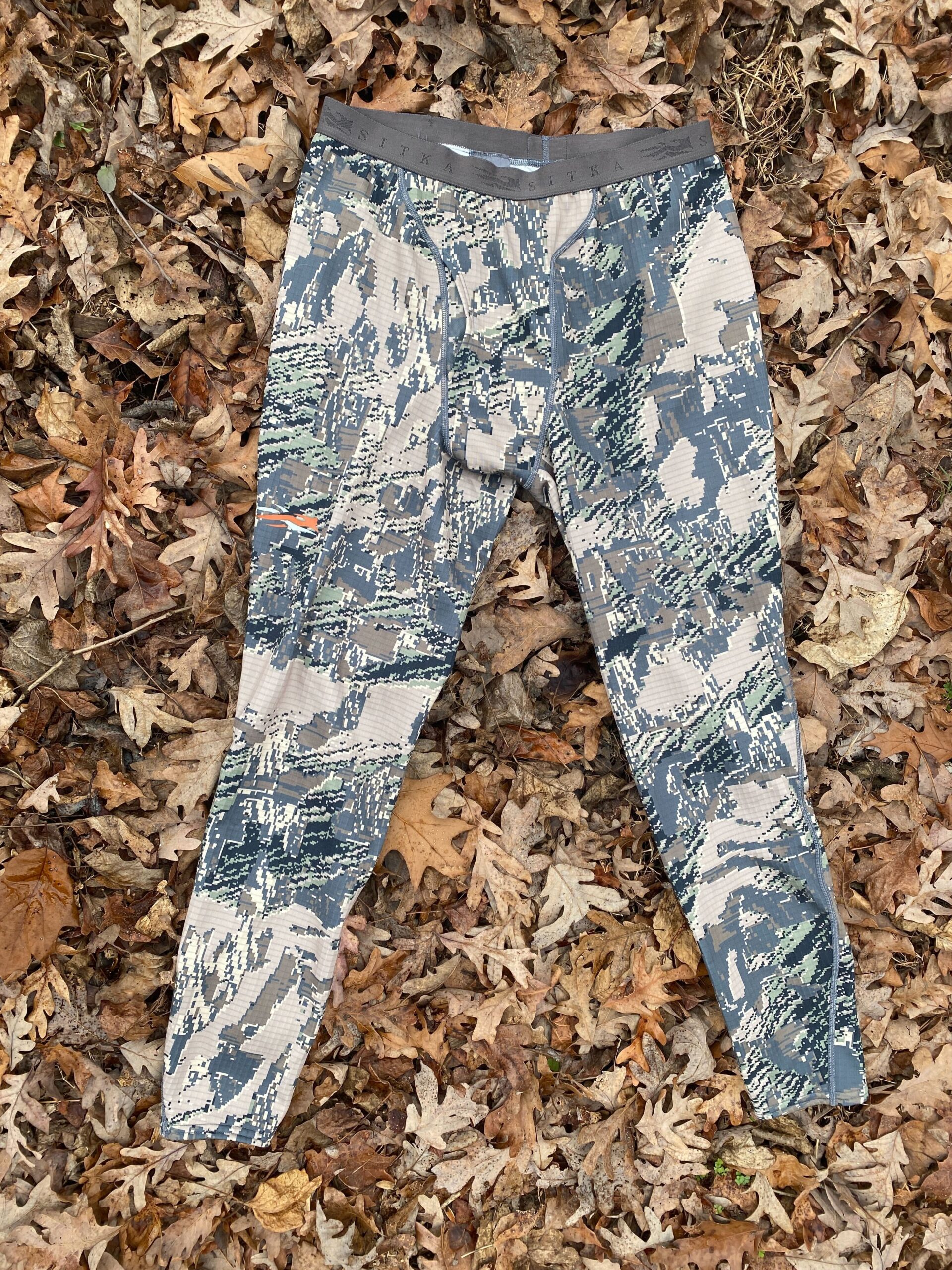
I wore these during Indiana’s opening week of turkey season, where low temps in the mornings dropped to the mid 30s and hit mid 70s by the afternoon. I ran the SITKA Cores all day and never got too hot in them even after logging several miles of hunting ground. At the end of week, they didn’t smell the best, but they didn’t turn any noses up either. These run a little on the pricey side, but I have zero complaints when it comes to SITKA’s durability. Treat these as an investment, and you’ll get your money’s worth years later when you’re still using them. –Adam Moore
Best USA Made: Origin Alpha Wool Base Layers
Key Features
- Made of 50% Repreve Polyester, 25% Wool, and 25% Tencel
- Weight: 6.2 ounces
- Colors: Woodland or Highland Camo
- Made in USA with USA made materials
Pros
- Good weight to warmth ratio
- Breathes well
Cons
- Over $100
Origin is not the company to buy from if you’re looking for cheap clothing. All the stuff they make is expensive, but that’s because they make everything in the USA with homegrown materials. I started wearing their jeans last year, which cost as much as these base layers, and was impressed with the quality. So I started getting more pieces from Origin, and among my favorites are the base layers. You could argue that your first layer is the most important because it’s not the one you’ll be shedding throughout the day. So it has to work or you’ll be miserable. That’s been my experience with the Nano Wool Base Leggings. Like a blue collar American, they just work. From long hikes to long sits, they’ve breathed better and kept me more comfortable than other base layers I’ve used.—Scott Einsmann
Read Next: Why Don’t More Hunting Companies Manufacture Camo in the United States?
Things to Consider Before Buying Thermal Underwear for Men
Long johns, base layers, thermal underwear, or whatever you call them, their purpose remains the same—keeping you warm and dry. Thermal underwear keeps you warm by trapping your own body heat close to your skin to provide a warming effect, even when the temps drastically drop. And a material’s ability to wick moisture ensures that you’ll stay dry in the sweatiest or wettest conditions.
Companies typically make thermal underwear from wool, synthetic material, or a blend of the two. And depending on your activities, some might be better suited than others for specific outdoor adventures. Other than a pair of the best hiking shoes, a great pair of thermals might be the most important piece of gear you buy for outdoor activities in the cold.
Wool
Wool, especially merino wool, is one of the best materials for thermal underwear. It can absorb up to 30 percent of its water weight and remain dry during cold, wet conditions. However, thermal underwear made from low-quality wool tends to be itchy and ineffective at wicking moisture. And depending on the temps or your activities, wool might be too warm for your specific needs.
Synthetic
Synthetic thermal underwear usually features a blend of polyester or nylon. These synthetic blends typically have excellent durability and moisture wicking capabilities, and I actually prefer a synthetic blend over other materials. These materials also tend to have more flexibility and not restrict your range of motion or movement.
Weight
If you want something that’s super lightweight but warm, Wool can sometimes be heavier while synthetic materials usually run lighter. And if you’re counting ounces in the backcountry, lighter materials probably fit the bill better. Oftentimes, however, you sacrifice that warmth for weight. But for most outdoor excursions, the slight weight difference in materials probably doesn’t matter that much, especially if you’re not counting ounces. Depending on your activities, look at which thermal underwear will work best for your needs.
Fit
Thermal underwear should be skin-tight to keep you warm. Consider thermal underwear brands that offer a slim profile vs a baggy one. The fit should be comfortable but not too loose. If your thermals fit loosely, they won’t keep out air or warm you as adequately as they would with a tighter fit.
Cost
I learned quickly that most cheap thermals just don’t cut it when it matters most. There’s nothing worse than shivering to death when you’re on a camping trip, and you realize that the thermals you skimped on are actually making you colder instead of warmer. And if you think there’s not a difference between a high-end set of thermal underwear and a cheap pair from your local dollar store, you’re in for a rude awakening. I’m a firm believer in getting what you pay for, not that there aren’t exceptions to this, but for the most part, warm, moisture wicking thermals don’t come cheap. However, when you bite it and take a face and chest-full of snow thirty minutes into your ski day, they’ll pay for themselves.
Read Next: The Best Thermal Underwear for Women of 2023
FAQs
Thermal underwear featuring merino wool or a merino wool blend is typically the warmest. And their moisture wicking capabilities will keep you warm even in active or wet conditions better than synthetic blends or other options. Out of the thermal underwear I tested, the Icebreaker 260s proved to be the warmest.
A base layer is any item close to your skin that provides a layer of warmth. Technically a t-shirt or underwear can be a base layer. Thermals are typically skin-tight base layers that are made out of wool or synthetics that circulate body heat to provide warmth. Thermals typically aren’t made of cotton like ordinary t-shirts or underwear are—they’re thicker and have moisture-wicking capabilities. While most thermals are meant to be worn under your clothes, especially close to the skin, base layers can often be worn as standalone pieces, too.
It’s recommended to wear underwear under your thermal bottoms to prevent any itchiness or chafing. Some people may wear thermal underwear bottoms only and this is fine, but in my experience, it’s better to have another layer to avoid friction and keep out excess moisture.
The warmest base layer material by far is merino wool. Wool is available in a variety of weights and textures and is one of the best fabrics for wicking moisture. Fine wools are generally less itchy and make better options for thermal underwear.
Thermals should have a tight fit because they pull the sweat away from your skin and release it throughout the fabric. This process keeps you dry and works to promote warmth and encourage heat retention. It’s also important for thermal underwear to fit tight, so there’s no excess space for air to move between them and your skin.
Read Next: Best Underwear for Hiking
Final Thoughts on the Best Thermal Underwear for Men
Thermal underwear is a must for cold weather activities. Period. I can’t stress it enough. I’ve been camping, hiking, skiing, and working in cold temperatures for years and only rely on the best thermal underwear for men to keep me comfortable, warm, and dry. Not only will they keep you warm, they’ll keep you outdoors longer, so you can keep enjoying your favorite outdoor activities even when the mercury drops.
- Best Overall: Smartwool Merino 150
- Best Lightweight: Patagonia Capilene Air Crew
- Best Electric: Pnuma Outdoors ICONX Heated Core Shirt and Pants
- Best for Extreme Weather: Icebreaker Merino Leggings
- Best for Running: Gore Wear R3 Thermo Tights
- Best for Skiing: Minus33 Yukon Men’s Crew
- Best for Camping: Meriwool Mens Merino 190 Long-Sleeve Henley
- Best for Work: Carhartt Force Classic
- Best Budget: TSLA Men’s Thermal Underwear
- Best for Hunting: SITKA Core Lightweight Bottoms and Top
